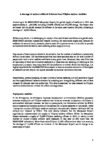Is there really a shortage of seafarer officers?
| dc.contributor.author | Tang, Lijun | |
| dc.date.accessioned | 2021-03-03T15:31:03Z | |
| dc.date.issued | 2021-03-01 | |
| dc.identifier.issn | 0144-1019 | |
| dc.identifier.uri | http://hdl.handle.net/10026.1/16914 | |
| dc.description.abstract |
According to the BIMCO/ICS Manpower Report, the global supply of seafarers in 2015 was approximately at 1,647,500, including 774,000 officers and 873,500 ratings. The Report also estimated that the global demand for officers in the same year stood at 790,500, indicating a shortage of 16,500 officers. Without any doubt, it is challenging to survey a fluid and diverse workforce on a global scale. BIMCO/ICS achieves unparalleled breadth covering the worldwide supply and demand for seafarers. In terms of depth, however, there is room for improvement as it is not able to provide accurate and detailed data on each seafaring labour supply country. One source of inaccuracy is related to the situation that the number of seafarers is notoriously difficult to estimate. The maritime authorities may have accurate data on the total number of people who hold a valid seafarer certificate at any given time. However, they have little idea of how many of them are still active seafarers (i.e. those who are working, or intending to find employment, at sea) or how many have left the profession or retired. Given this challenge, it is highly improbable for the BIMCO/ICS surveyors to have an accurate estimation of the supply of seafarers as they rely on the figures provided by national maritime authorities. Nevertheless, without knowing the exact number of active seafarers, it is still possible to figure out the supply/demand balance situation by analysing and triangulating different sets of data released by national maritime authorities. This article examines the data released by Filipino maritime authorities and revisits the officer shortage claim. | |
| dc.format.extent | 14-16 | |
| dc.language.iso | en | |
| dc.publisher | The Nautical Institute | |
| dc.title | Is there really a shortage of seafarer officers? | |
| dc.type | journal-article | |
| plymouth.publisher-url | https://www.nautinst.org/resource-library/publications/seaways.html | |
| plymouth.journal | Seaways | |
| plymouth.organisational-group | /Plymouth | |
| plymouth.organisational-group | /Plymouth/Faculty of Arts, Humanities and Business | |
| plymouth.organisational-group | /Plymouth/REF 2021 Researchers by UoA | |
| plymouth.organisational-group | /Plymouth/REF 2021 Researchers by UoA/UoA17 Business and Management Studies | |
| plymouth.organisational-group | /Plymouth/Users by role | |
| plymouth.organisational-group | /Plymouth/Users by role/Academics | |
| dcterms.dateAccepted | 2021-02-28 | |
| dc.rights.embargodate | 2021-3-11 | |
| dc.identifier.eissn | 0144-1019 | |
| dc.rights.embargoperiod | Not known | |
| rioxxterms.licenseref.uri | http://www.rioxx.net/licenses/all-rights-reserved | |
| rioxxterms.licenseref.startdate | 2021-03-01 | |
| rioxxterms.type | Journal Article/Review |


